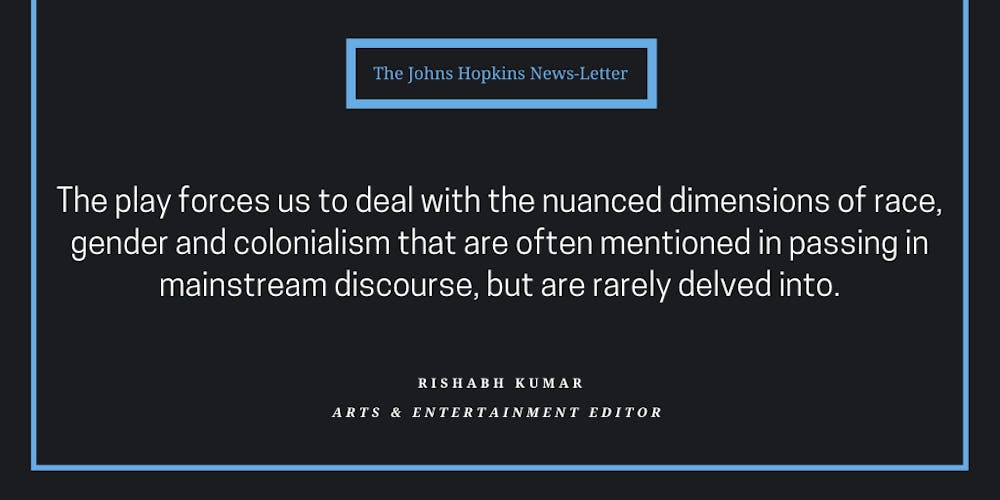Last weekend, the Dunbar Baldwin Hughes Theater Company (DBH) performed School Girls; Or, the African Mean Girls Play. The play, written by the Ghanaian American playwright Jocelyn Bioh, is inspired by the real-life story of the model Erica Nego, the Ghanaian representative for Miss Universe in 2011, and the discourses of colorism and national representation that played out in Ghana based on her appearance.
The play’s setting is an all-girls boarding school in Ghana, one that seems to be prestigious but has recently seen a dip in its reputation and funding. We see Headmistress Francis, played by freshman Samantha Jones, struggling to prevent the school’s decline. She sees opportunity in the upcoming Miss Ghana competition – the selection of one of her students could bring renewed interest (and status) to the school.
Francis pegs Paulina Sarpong (played by senior Cherease Lamm) as the best prospect. Paulina is a confident, popular figure who bosses around the other girls, who put up with her cruel remarks for the sake of being near her.
Yet as the play progresses, we find Paulina’s authority strained; a new student arrives from the U.S. — Ericka Boafo, played by senior Tara Desporte — comes with a rich father, a nonjudgmental attitude and a fairer-skinned complexion than the rest of the girls in the school.
Gradually, Paulina and Ericka descend into outright animosity, culminating in their musical performances in front of the selector for the Miss Ghana competition. Both of them derail the competition, and along with their friends (who take Ericka’s side), we learn that Paulina faked having a boyfriend to seem more popular, and bleached her skin to look fairer for the competition.
Meanwhile, Paulina claims that Ericka is actually not a Ghanaian citizen (a necessity for Miss Ghana) and that she was born in America to a white mother – her Ghanaian father only taking her in after her mother had died.
As the audience witnesses the consequences of these truths and the nuanced exploration of the confluences of peer pressure, colorism and nationality, so do the characters in the story. We see the selector, Eloise Amponsah (played by senior Mariama Morray), a former Miss Ghana from the same school who is obsessed with rekindling her fame and status, ignore the revelations of Ericka’s nationality and still choose her as the representative, trusting that her fairer skin would be able to take Ericka (and Eloise) not only to Miss Ghana, but to Miss Universe.
Headmistress Francis, the one adult in the story who we’ve seen behave with love and compassion, eventually accepts this arrangement, despite her moral qualms, due to the prospect of financial contributions. Paulina, witnessing the situation, agrees to pretend that her claim about Ericka’s heritage was false, thus preventing the allegations from having any weight.
At the end of the play, we see this bargain eventually come to naught when Ericka, despite having won Miss Ghana, is unable to qualify for the semifinals of Miss Universe. We see the girls sit around a tiny television in their classroom, listening to the names of Miss Sweden and Miss South Africa (the only white African representative) get ticked off as semifinalists, waiting to hear the name of Miss Ghana that would never come.
Director Benedict Dorsey explained the value of the play in an interview posted to the DBH Theater Instagram.
“The play pulls back the cover to expose that all while Black folks are demanding folks not to discriminate against people of color, discrimination still exists within these communities,” he said.
This discrimination comes in forms of internalized racism and propping up white and eurocentric standards of beauty — even in a Ghana that had already decolonized. Thus, the play forces us to deal with the nuanced dimensions of race, gender and colonialism that are often mentioned in passing in mainstream discourse, but are rarely delved into. At the same time, though, the play translates these serious discussions with excellent chemistry between the cast, in particular with the backstabbing, cruelty and mockery among students, which makes the original Mean Girls seem like small fish.
Overall, it was a thoroughly enjoyable and thought-provoking fall showcase by DBH Theater, leaving the audience wanting more from the group.

















